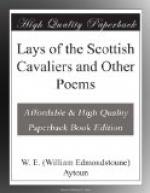Then, like men that need not tremble,
Go to our appointed place.
God, our Father, will not fail us
In that last tremendous hour,—
If all other bulwarks crumble,
he will be our strength and tower:
Though the ramparts rock beneath us,
And the walls go crashing down,
Though the roar of conflagration
Bellow o’er the sinking town;
There is yet one place of shelter,
Where the foeman cannot come,
Where the summons never sounded
Of the trumpet or the drum.
There again we’ll meet our children,
Who, on Flodden’s trampled sod,
For their king and for their country
Rendered up their souls to God.
There shall we find rest and refuge,
With our dear departed brave;
And the ashes of the city
Be our universal grave!”
THE EXECUTION OF MONTROSE
The most poetical chronicler would find it impossible to render the incidents of Montrose’s brilliant career more picturesque than the reality. Among the devoted champions who, during the wildest and most stormy period of our history, maintained the cause of Church and King, “the Great Marquis” undoubtedly is entitled to the foremost place. Even party malevolence, by no means extinct at the present day, has been unable to detract from the eulogy pronounced upon him by the famous Cardinal de Retz, the friend of Conde and Turenne, when he thus summed up his character:—“Montrose, a Scottish nobleman, head of the house of Grahame—the only man in the world that has ever realised to me the ideas of certain heroes, whom we now discover nowhere but in the lives of Plutarch—has sustained in his own country the cause of the King his master, with a greatness of soul that has not found its equal in our age.”
But the success of the victorious leader and patriot is almost thrown into the shade by the noble magnanimity and Christian heroism of the man in the hour of defeat and death. Without wishing, in any degree, to revive a controversy long maintained by writers of opposite political and polemical opinions, it may fairly be stated that Scottish history does not present us with a tragedy of parallel interest. That the execution of Montrose was the natural, nay, the inevitable, consequence of his capture, may be freely admitted even by the fiercest partisan of the cause for which he staked his life. In those times, neither party was disposed to lenity; and Montrose was far too conspicuous a character, and too dangerous a man, to be forgiven. But the ignominious and savage treatment which he received at the hands of those whose station and descent should at least have taught them to respect misfortune, has left an indelible stain upon the memory of the Covenanting chiefs, and more especially upon that of Argyle.




